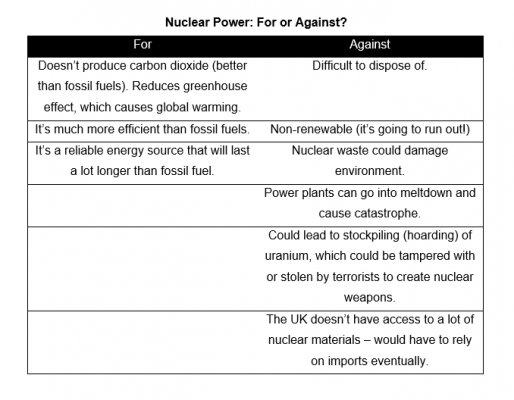When studying for your GCSEs, it’s vital that you establish good habits and methods that will help you focus, and ensure that you’re working smart, as well as working hard. In my last post, we covered the three main types of learning: visual, aural and kinaesthetic. We also looked at some revision tactics that you can use if you fall under each style. In this post, we’re going to have a look at some more of the best revision methods for GCSE.
Visual Learning
Creating Tables
Tables are a great way of organising information into different categories. For example, you might need to consider the pros and cons of nuclear power. You can sort your notes by creating a table like so:

If you have to, you can make more columns to add other categories. Since the space to write in is usually quite small, you need to be able to summarise ideas briefly in your own words. If you’re able to do this, it shows that you understand what the ideas are.
Aural Learning
Self-recording
Self-recording is another one of the best revision methods for GCSE. For this technique, all you need is your voice, some reading material and a device which you can record yourself with. In the past, you would have had to use a specific device called a dictation machine to record yourself. Nowadays, almost any modern smartphone or tablet has voice recording capabilities. So long as it has a microphone, it should be able to record your voice as well. If these options aren’t available, dictation machines aren’t too expensive, and they might be worth the investment.
Note: Many laptops can record your voice too. If it has a camera, it’s probably capable of recording your voice with its microphone!
If you’ve chosen to use the “reading aloud” method of revision, you might as well record yourself at the same time. The self-recording technique is quite simple; all you need to do is record yourself reading your notes.
The great thing about this method is that both recording and listening help you to remember information. While you’re reading your notes out loud into the microphone, you’re going to be committing them to memory, just like you would when reading out loud. Once you’re done reading all of them, you can listen to them through speakers or headphones whenever you’re studying.
Here are some tips to make your recordings even easier to study from:
• Make sure you’re not speaking too close to the microphone, or too far away from it. Do a couple of test runs to make sure your microphone is working properly.
• Speak slowly and clearly, so that you can listen back easily.
• Place emphasis on the more important details in your notes. Try changing your tone of voice for certain key phrases or facts, so that they stick out more.
• When you’re done recording, send the files to your phone or smart device so that they’re always handy.
Whenever you have a free 10 minutes or so, you can listen to your notes.
Kinaesthetic Learning
Learning Games
For this technique, you’re probably going to need access to either the internet or dedicated workbooks. You’ll want to find games or other interactive tools which involve doing things rather than just reading them. For example, one game might require you to match up key words to their meanings, or key dates to the events which occurred on them. You can actually do this one yourself, in the same way that you made flashcards. Cut up a large piece of paper in separate pieces, and then on half of them write a key word. Then write something related to each key word on all of the other pieces. Shuffle up all of the cards, then try to match them up.
You should also check online for other learning games. As always, double check that the content of the games matches what you’re learning in class, so you don’t confuse yourself.
Conclusion
By now, you have access to some of the best revision methods for GCSE. GCSEs can be tough, but with the right frame of mind and the right tools at your disposal, you can overcome them and achieve something incredible.
Looking for more tips and the best revision methods for GCSE? Check out our book, Pass Your GCSEs With Level 9s.
